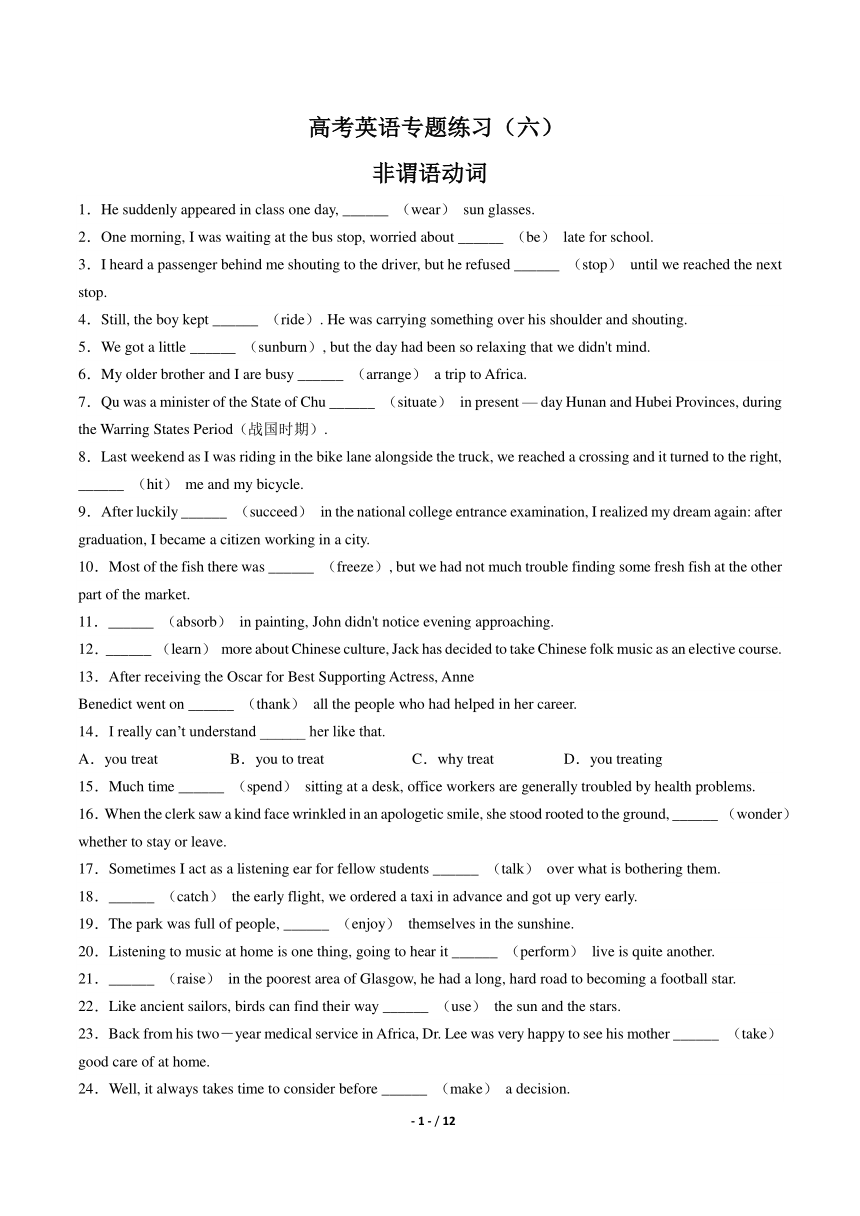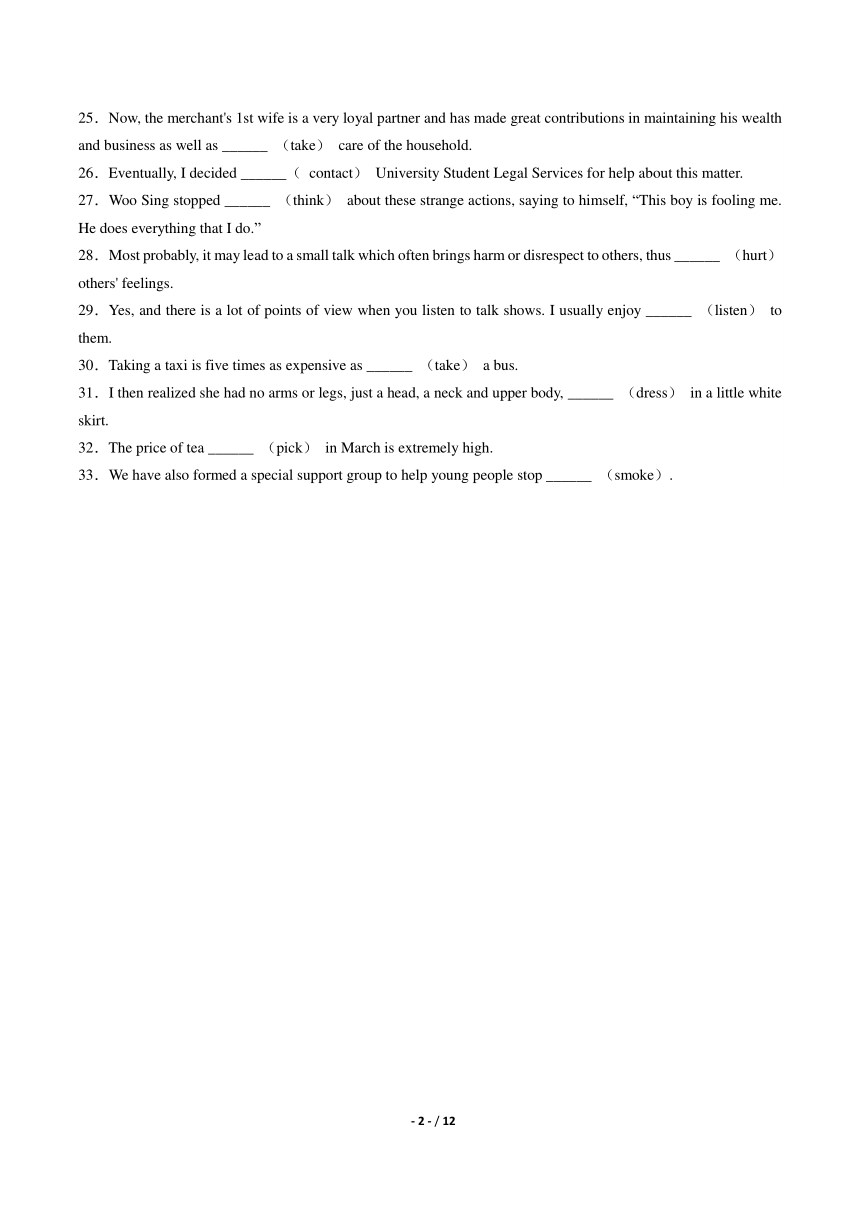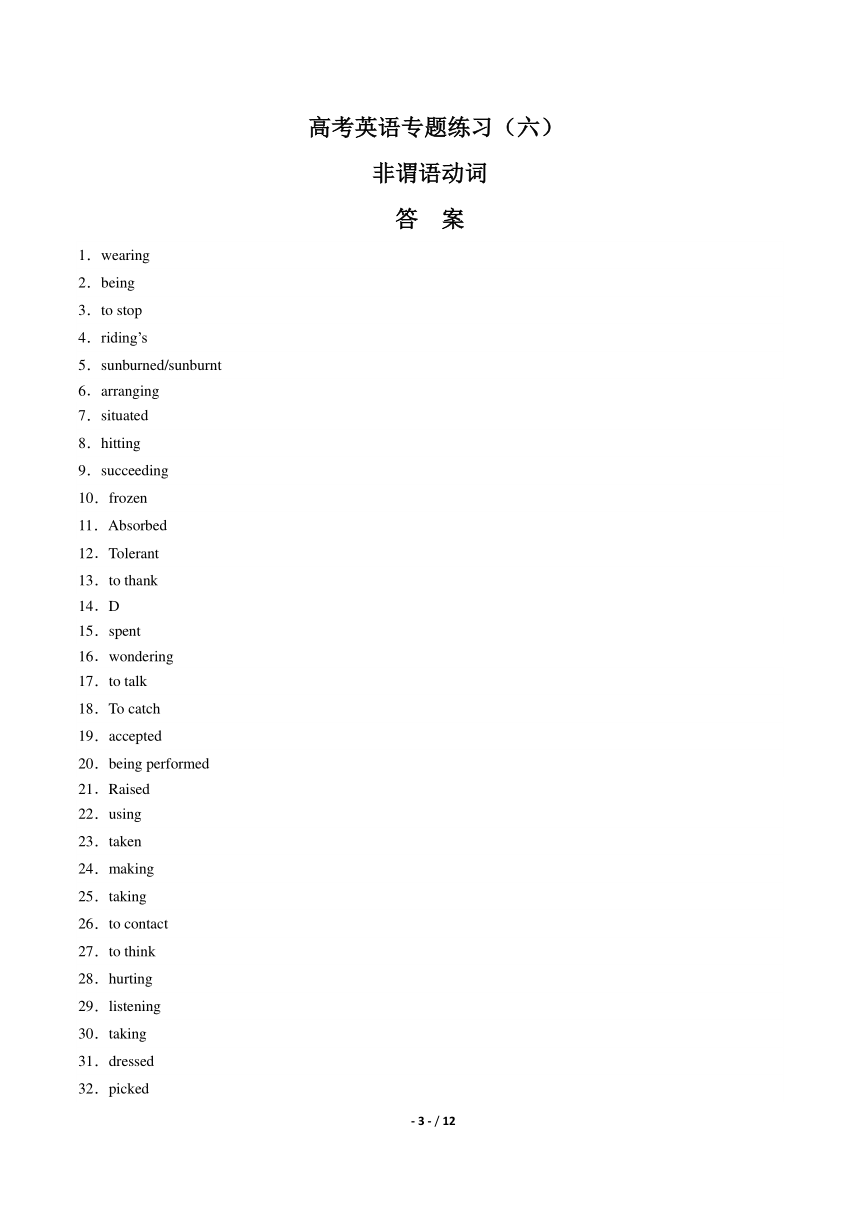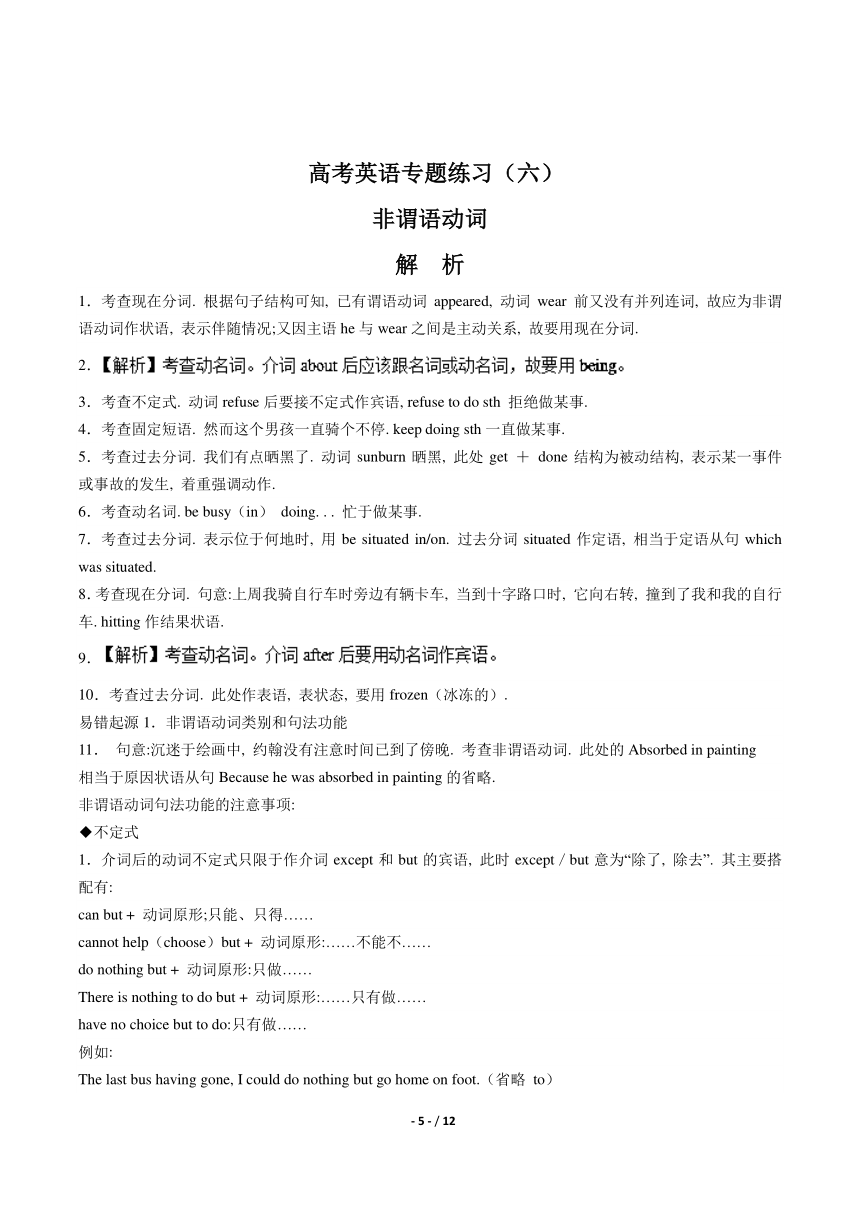高考英语- 非谓语动词-专题练习(六)
图片预览





文档简介
高考英语专题练习(六)
非谓语动词
1.He suddenly appeared in class one day, ______ (wear) sun glasses.
2.One morning, I was waiting at the bus stop, worried about ______ (be) late for school.
3.I heard a passenger behind me shouting to the driver, but he refused ______ (stop) until we reached the next stop.
4.Still, the boy kept ______ (ride). He was carrying something over his shoulder and shouting.
5.We got a little ______ (sunburn), but the day had been so relaxing that we didn't mind.
6.My older brother and I are busy ______ (arrange) a trip to Africa.
7.Qu was a minister of the State of Chu ______ (situate) in present — day Hunan and Hubei Provinces, during the Warring States Period(战国时期).
8.Last weekend as I was riding in the bike lane alongside the truck, we reached a crossing and it turned to the right, ______ (hit) me and my bicycle.
9.After luckily ______ (succeed) in the national college entrance examination, I realized my dream again: after graduation, I became a citizen working in a city.
10.Most of the fish there was ______ (freeze), but we had not much trouble finding some fresh fish at the other part of the market.
11.______ (absorb) in painting, John didn't notice evening approaching.
12.______ (learn) more about Chinese culture, Jack has decided to take Chinese folk music as an elective course.
13.After receiving the Oscar for Best Supporting Actress, Anne
Benedict went on ______ (thank) all the people who had helped in her career.
14.I really can’t understand ______ her like that.
A.you treat B.you to treat C.why treat D.you treating
15.Much time ______ (spend) sitting at a desk, office workers are generally troubled by health problems.
16.When the clerk saw a kind face wrinkled in an apologetic smile, she stood rooted to the ground, ______ (wonder) whether to stay or leave.
17.Sometimes I act as a listening ear for fellow students ______ (talk) over what is bothering them.
18.______ (catch) the early flight, we ordered a taxi in advance and got up very early.
19.The park was full of people, ______ (enjoy) themselves in the sunshine.
20.Listening to music at home is one thing, going to hear it ______ (perform) live is quite another.
21.______ (raise) in the poorest area of Glasgow, he had a long, hard road to becoming a football star.
22.Like ancient sailors, birds can find their way ______ (use) the sun and the stars.
23.Back from his two-year medical service in Africa, Dr. Lee was very happy to see his mother ______ (take) good care of at home.
24.Well, it always takes time to consider before ______ (make) a decision.
25.Now, the merchant's 1st wife is a very loyal partner and has made great contributions in maintaining his wealth and business as well as ______ (take) care of the household.
26.Eventually, I decided ______( contact) University Student Legal Services for help about this matter.
27.Woo Sing stopped ______ (think) about these strange actions, saying to himself, “This boy is fooling me. He does everything that I do.”
28.Most probably, it may lead to a small talk which often brings harm or disrespect to others, thus ______ (hurt) others' feelings.
29.Yes, and there is a lot of points of view when you listen to talk shows. I usually enjoy ______ (listen) to them.
30.Taking a taxi is five times as expensive as ______ (take) a bus.
31.I then realized she had no arms or legs, just a head, a neck and upper body, ______ (dress) in a little white skirt.
32.The price of tea ______ (pick) in March is extremely high.
33.We have also formed a special support group to help young people stop ______ (smoke). - 2 - / 2
高考英语专题练习(六)
非谓语动词
答 案
1.wearing
2.being
3.to stop
4.riding’s
5.sunburned/sunburnt
6.arranging
7.situated
8.hitting
9.succeeding
10.frozen
11.Absorbed
12.Tolerant
13.to thank
14.D
15.spent
16.wondering
17.to talk
18.To catch
19.accepted
20.being performed
21.Raised
22.using
23.taken
24.making
25.taking
26.to contact
27.to think
28.hurting
29.listening
30.taking
31.dressed
32.picked
33.smoking
高考英语专题练习(六)
非谓语动词
解 析
1.考查现在分词. 根据句子结构可知, 已有谓语动词appeared, 动词wear前又没有并列连词, 故应为非谓语动词作状语, 表示伴随情况;又因主语he与wear之间是主动关系, 故要用现在分词.
2.
3.考查不定式. 动词refuse后要接不定式作宾语, refuse to do sth 拒绝做某事.
4.考查固定短语. 然而这个男孩一直骑个不停. keep doing sth一直做某事.
5.考查过去分词. 我们有点晒黑了. 动词sunburn晒黑, 此处get + done结构为被动结构, 表示某一事件或事故的发生, 着重强调动作.
6.考查动名词. be busy(in) doing. . . 忙于做某事.
7.考查过去分词. 表示位于何地时, 用be situated in/on. 过去分词situated作定语, 相当于定语从句which was situated.
8.考查现在分词. 句意:上周我骑自行车时旁边有辆卡车, 当到十字路口时, 它向右转, 撞到了我和我的自行车. hitting作结果状语.
9.
10.考查过去分词. 此处作表语, 表状态, 要用frozen(冰冻的).
易错起源1.非谓语动词类别和句法功能
11. 句意:沉迷于绘画中, 约翰没有注意时间已到了傍晚. 考查非谓语动词. 此处的Absorbed in painting
相当于原因状语从句Because he was absorbed in painting的省略.
非谓语动词句法功能的注意事项:
◆不定式
1.介词后的动词不定式只限于作介词except和but的宾语, 此时except/but意为“除了, 除去”. 其主要搭配有:
can but + 动词原形;只能、只得……
cannot help(choose)but + 动词原形:……不能不……
do nothing but + 动词原形:只做……
There is nothing to do but + 动词原形:……只有做……
have no choice but to do:只有做……
例如:
The last bus having gone, I could do nothing but go home on foot.(省略 to)
I cannot choose but tell him the truth.(省略 to)
She could do nothing but leave.(省略 to)
I have no choice but to cry.(不能省略to)
2.不定式在使役动词have, let, make以及感官动词see, look at, watch, notice, observe, hear, listen to, feel后的宾补, 不定式符号要省略, 但这些句子变为被动结构时, 就必须带符号to. 例如:
I often hear him sing this song. →
He is often heard to sing this song.
I saw them play in the park. →
They were seen to play in the park.
3.不定式作定语与所修饰的名词之间存在着逻辑上的主谓关系或动宾关系. 如果作定语的不定式使不及物动词, 或者不定式所修饰的名词或代词是其动作的地点、工具等, 不定式后须有相应的介词. 但名词way, place, way除外. 例如:
He is not a man to tell lies.(主谓关系)
There will not be enough space to stand in on the earth.(动宾关系)
Here is some paper for you to write on.
The boy has a nice pen to write with.
We found a way to solve this problem(in).
通常使用不定式作定语的情况有:(1)不定式表示将来;(2)用来修饰被序数词、最高级或no, all, any等限定词的中心词. (3)用来修饰一些抽象名词, 常见的有:ability, disability, chance, idea, fact, excuse, promise, answer, reply, attempt, belief, way, reason, time等. 例如:
During my holidqy I borrowed some books to read.(表将来)
She was the first woman to win the gold medal in the Olympic Games.(有序数词修饰)
I have no chance to escape.(修饰抽象名词)
Do you have the ability to read French? (修饰抽象名词)
4.不定式作状语时可以表示目的、原因、结果或条件. 表示目的时可用in order to, so as to换用;表示条件时, 一般把表示条件的动词不定式置于句首, 句中的谓语动词常含有will, shall, should, would, can, must, could等情态动词. 例如:
He sat down to have a rest.(表目的)
He woke up to find everybody gone.(表结果)
I’m very pleased to hear from him.(表原因, 主要是表示喜、怒、哀、乐)
To look at him, you can’t help laughing.(表条件, 谓语动词含有can)
He was too excited not to say a word.(表程度)
He is old enough to go to school.(表程度)
◆过去分词、不定式和现在分词的被动式作定语的区别:
这三种形式作定语, 主要是体现在动作发生的时间上的区别. 过去分词表示的动作或是在谓语所表示的动作之前或是没有一定的时间性;现在分词的被动式作定语时表示的动作正在发生或是与谓语动词所表示的动作同时发生;不定式的被动式作定语时, 表示一个未来的动作. 例如:
The bridge to be built is named Stone in honor of the hero.(将要修建的)
The bridge being built is named Stone in honor of the hero.(正大修建的)
The bridge built is named Stone in honor of the hero.(己经修建了的)
Have you read the novel written by Dickens?
He is a teacher loved anti respected by all students.(没有时间性)
Listen! The song being sung is very popular with the young men.(表正在)
The question to be discussed at the Sunday meeting is very important.(表将来)
在英语中, 表示“感觉状态”的动词现在分词和过去分词形式作表语和定语时, 现在分词表示“令人感到……”, 指主语或被修饰的词给人的感觉;过去分词表示“感到……” , 指主语或被修饰的词本身的感觉. 例如:
interesting令人感兴趣的interested感到有兴趣的
exciting令人感到激动的excited感到激动的
shocking令人感到震惊的shocked感到震惊的
◆过去分词、不定式和现在分词作宾语补足语的区别:
1.感官动词(see, look at, watch, notice, observe, hear, listen to, feel)和使役动词(have, let, make)后的宾补有三种形式, 即原形动词(不带to的不定式), 现在分词和过去分词. 现在分词表示主动和正在进行, 过去分词表示被动完成, 不定式表示主动和完成. 注意:make不能接现在分词作宾补.
例如:
I heard her sing a Chinese song jut now.(表示主动, 完成)
I heard her singing a Chinese song when I passed by her room last night.(表示正在进行)
I heard the Chinese song sung many times.(表示被动)
The captain got/have the soldiers moving to ward the front after a short rest.(不能用make)
I looked down at my neck and found my necklace gone.(表示状态)
I was surprised to find my hometown changed a lot.(表示完成)
2.动词leave后接三种形式作宾补时, 表达的具体含义是“使……处于某种状态”. 例如:
It is wrong for you to leave the machine running.(主动, 正在进行)
The guests left most of the dishes untouched.(被动, 完成)
My workmate left, leaving me to do all the rest work.(主动, 将来)
My workmate left, leaving all the rest work to be done.(被动, 将来)
◆过去分词和现在分词作状语的区别:
1.一般来说, 过去分词表示被动完成的动作, 现在分词表示主动进行的动作. 例如:
Seen from a distance, the mountain looked like a man. ks5uKs5u. Com]
Seeing the mountain, he always thinks of his hometown.
2.现在分词的被动一般式表示正在进行的被动动作, 过去分词表示被动完成的动作. 例如:
Being helped by the teacher, she will learn English well.
Helped by the teacher, she has learned English well.
3.现在分词的被动完成式表示先于谓语动词动作发生的动作, 过去分词所表示的动作, 有时发生在谓语动词之前, 有时与谓语动词同时发生, 有时表示未来的被动动作或状态. 例如:
Having been used for a long time, the watch needs to be mended.
Used in this way, the word shouldn’t be taken as a verb.
Given more time, we will finish the work perfectly.
◆独立主格结构
分词短语作状语时, 其逻辑主语必须与句子的主语一致. 如果与句子的主语不一致, 那么分词短语就需要有自己的逻辑主语, 这就是独立主格结构形式.
独立主格结构是分词短语意义上的逻辑主语, 通常由名词或代词来充当, 放在分词之前. 因为没有实际的主语和谓语, 独立主格结构不是句子, 一般放在句首或句末, 充当时间、原因、方式等状语. 例如:
Winter having come, it’s getting colder and colder.
The homework finished, the child went home.
His leg badiy hurt, he had to stay in bed.
Time permitting, we’ll visit the Summer Palace.
She lay against the wall, the sun shinning upon her.
从例句可以看出, 独立主格结构中分词的逻辑主语和句子的主语是两个不同的人或物, 因此, 分词前的名词或代词不能省略.
独立主格结构也可以由“with/without + 名词或代词 + 分词、不定式、形容词、副词或介词短语”构成. 例如:
The boy stared at the teacher, with his mouth opon.
With his parents away, the boy became naughtier.
The teacher came into the classroom, with a book in her hand(= book in hand).
She sat still, with her eyes closed.(被动, 状态)
She sat still, with her eyes looking at the ceiling.(主动, 正在)
With you to help me, I could do it better.(主动, 将来)
With a lot of problems settled, the mayor went to have a holiday.(被动, 完成)ks5u
With a lot of problems to be settled, the mayor has a hard time.(被动, 将来)
◆垂悬分词作状语
垂悬分词是现在分词一种特殊用法, 其逻辑主语是句子非主语部分中指人或物的某一名词或代词, 或泛指“我们”. 例如:
Searching along the street, it had taken him along time to find a clinic.(searching 的逻辑主语是句中him 所指的人)
Walking or sleeping, this subject is always in my mind.(walking or sleeping 的逻辑主语是句中my所指的“我”)
Using the electric energy, it is necessary to change its form.(using 的逻辑主语泛指“我们”)
易错起源2.非谓语动词的时态和语态
12.
动词不定式的时态和语态
当不定式的逻辑主语是不定式所表示的动作的承受者时, 一般使用不定式的被动语态, 形式有一般式和完成式(进行式没有被动式). 例如:
Her father disappeared, never to be heard from again.(hear from和his father之间是被动关系)
The book is sid to have been tramlated into many languages.(translate和the book之间是被动关系)
注意:不定式中使用主动代替被动的情况:
(1)不定式所修饰的名词或代词构成逻辑上的主谓关系时, 不定式往往用主动形式. 例如:
I haven’t got a key to unlock the door.(to unlock the door的逻辑主语是a key)
(2)不定式所修饰的名词或代词构成逻辑上的动宾关系, 又和主语构成主谓关系时, 不定式往往用主动形式. 例如:
I haven’t got a book to read.(I为不定式的逻辑主语, a book为不定式的逻辑宾语)
(3)不定式作宾语形容词的状语, 和句中的主语构成了逻辑上的动宾关系, 不定式多用主动, 实际上形容词后省略了for one或for people. 例如:
The book is difficult(for me) to understand.
He is hard(for me) to work with.
(4)在there be结构中, 如果考虑必须有人去完成某事时, 用主动;如果强调事情本身必须完成时, 用被动. 例如:
There is a lot of to be done.(工作被作)
There is a lot of to do.(需要人去做)
动名词的时态和语态
动名词一般式所表示的动作与谓语所表示的动作同时发生或是在谓语动词所表示的动作之后发生. 如果动名词的动作发生在谓语动词所表示的动作之前, 则用动名词的完成式. 如果动名词的逻辑这样是动名词动作的承受者, 这时用动名词的被动式. 例如:
We are interested in playing chess.(同时)
She is looking forward to hearing from you again.(之后)
I’m sorry for not having kept my promise.(之前)
The little boy was afraid of being left at home alone.(被动)ks5u
The house showed no sign of having been damaged.(之前, 被动)
易错起源3.非谓语动词的固定搭配
13.
英语中非谓语动词的固定搭配是因词而定, 没有固定的规律. 考生只有牢记它们的形式, 才能成功破题.
1.下列动词或动词短语后面只接动名词作宾语:
admit, allow, appreciate, avoid, consider(考虑), delay, dislike, enjoy, escape, excuse, finish, imagine, keep, mind, miss(错过), practice, risk, resist, suggest, suffer等动词;
be used to(习惯于), insist on, can’t help(情不自禁), can’t stand(无法忍受), give up, feel like, keep on, look forward to, put off, devote to, stick to, object to, thank you for, be busy(in), get down to, lead to, see to, have difficult/trouble(in), have a good/wonderful/hard time(in)等动词组.
2.下列动词或动词短语后面能接动名词或不定式作宾语, 但意义上有区别:
forget/remember/regret to do忘记/记住/后悔去做某事
forget/remember/regret doing忘记/记得/后悔已经做过某事
stop to do停下来接着做另一件事stop doing停止做一件事
mean to do意欲、企图做某事mean doing意味着做某事
go on to do做完某事接着做另一件事go on doing继续做同一件事
try to do努力、试图做某事try doing尝试着做某事
3.有些短语作状语是固定结构:
judging from, generally/ frankly/ honestly/ strictly speaking, considering(that). . .(考虑到……), supposing/ providing(that). . .(假如……), seeing(that). . .(既然, 由于……), to tell you the truth, to make things worse, to begin with
(首先, 第一). 例如:
Judging from his accent, he must be a southerner.
Tuning to the left, he saw a bus passing.
Considering everything, he did a good job.
Seeing(that) she is lawfully old enough to get married, I don’t see how you can stop her.
易错起源4.非谓语动词逻辑主语的表达形式和否定形式
【错误解答】 A或B
14.
非谓语动词的逻辑主语也就是非谓语动词的动作执行者. 在不定式中, 逻辑主语是of或for的 介词宾语, 或是句子的主语, 或是句子的宾语.
例如:
It is important for us to work hard.(to work is important. 只能用for)
It is kind of you to help me to clean the room.(you are kind. 只能用of)
We want to go with you to have a picnic.
Little Tom liked to be taken to the cinema.
I want the report to be typed as quickly as possible.
The manager asked me to type the report as quickly as possible.
动名词的复合结构在句中作主语时, 其逻辑主语必须是形容词性物主代词或名词的所有格;作宾语、表语时, 其逻辑主语是形容词性物主代词、人称代词、名词的所有格或普通格;无生命名词或有生命的名词表示泛指时, 必须用名词的普通格或人称代词的宾格. 例如:
Tom’s coming surprised all of us(主语)
His not attending the meeting made the manager very angry.(主语)
Would you mind me/my opening the window?(宾语)
They all thought Tom’s /Tom going there a great mistake.(宾语)
Is there any hope of their team winning the game?(无生命)
I have never heard of women landing the moon.(有生命, 但表泛指)
分词作状语时, 其逻辑主语和主句的主语是一致的, 如果不同则要用到独立主格结构形式(见上文).
例如:
Being a student, you must study hard.
When crossing the streets you must be careful.
If heated to high temperature, ice can change into water.
15.句意:大部分时间坐办公桌, 办公室职员通常被健康问题所困扰. time 与spend之间构成被动关
系, 另外该题实际考查了非谓语动词的独立主格结构.
16.
17.Sometimes I act as a listening ear for fellow students (talk)over what is bothering them.
17.句意:有时候我充当同学们的倾诉对象, 让他们通过倾诉释放心头的烦心事. for sb to do sth是不定式的复合结构, 在句中作定语, 修饰a listening ear.
18.句意:为了赶上早班飞机, 我们提前预定了出租车并且很早就起了床. 此处用不定式作目的状语, 表示提前预定出租车并且早起的目的.
19.If(accept)for the job, you'll be informed soon.
19.句意:如果录用你做这份工作, 你将会很快得到通知. 句子的主语you和动词accept之间为逻辑上的动宾关系, 故用过去分词.
20.句意:在家听音乐是一回事, 去现场听音乐演奏是另外一回事. hear. . . doing. . . 听到……正在做……, 此处宾语it与动词perform之间为动宾关系, 故要用现在分词的被动形式作宾语补足语.
21.
22.句意:就像古时候的水手一样, 鸟能利用太阳和星星找到它们的路. 根据语境, use与其句中隐含的逻辑主语birds之间为主动关系, 故用v. -ing形式的一般式, 在句中作伴随状语, 表示与find同时发生.
23.句意:在他两年的非洲医疗服务回来后, 李博士很高兴地看到他在家中被照顾得很好的母亲. 考查非谓语动词. 此处考查非谓语动词做后置定语, mother和take good care of之间是被动关系, 故用过去分词.
24.考查动名词. 在做决定之前要认真考虑. before是介词, 后跟动名词.
25.考查动名词. as well as 连接并列结构, take在形式上要与maintain保持一致.
26.考查不定式. decide to do. . . 决定做某事.
27.考查不定式. Woo Sing停下来想这些奇怪的行为……. stop to do sth停下来去做某事.
28.考查现在分词. 句意:很有可能, 这种好奇心会导致闲言碎语, 而那些闲言碎语会对别人造成伤害或者不尊重, 这样就伤害了别人的感情. 现在分词作结果状语, 主语a small talk 和hurt之间为主谓关系, 故要用现在分词.
29.
30.考查动名词. 这里taking a bus和taking a taxi进行比较.
31.考查过去分词. 此处过去分词短语dressed in. . . 相当于定语从句who was dressed in.
32.考查过去分词. tea与动词pick之间是被动关系, 故用过去分词作后置定语.
33.考查动名词. stop to do sth 停下来去做某事;stop doing sth 停止正在做的事情. 根据语境可知“我们还成立了一个特殊的小组去帮助青少年戒烟”. stop smoking戒烟.
- 10 - / 10
非谓语动词
1.He suddenly appeared in class one day, ______ (wear) sun glasses.
2.One morning, I was waiting at the bus stop, worried about ______ (be) late for school.
3.I heard a passenger behind me shouting to the driver, but he refused ______ (stop) until we reached the next stop.
4.Still, the boy kept ______ (ride). He was carrying something over his shoulder and shouting.
5.We got a little ______ (sunburn), but the day had been so relaxing that we didn't mind.
6.My older brother and I are busy ______ (arrange) a trip to Africa.
7.Qu was a minister of the State of Chu ______ (situate) in present — day Hunan and Hubei Provinces, during the Warring States Period(战国时期).
8.Last weekend as I was riding in the bike lane alongside the truck, we reached a crossing and it turned to the right, ______ (hit) me and my bicycle.
9.After luckily ______ (succeed) in the national college entrance examination, I realized my dream again: after graduation, I became a citizen working in a city.
10.Most of the fish there was ______ (freeze), but we had not much trouble finding some fresh fish at the other part of the market.
11.______ (absorb) in painting, John didn't notice evening approaching.
12.______ (learn) more about Chinese culture, Jack has decided to take Chinese folk music as an elective course.
13.After receiving the Oscar for Best Supporting Actress, Anne
Benedict went on ______ (thank) all the people who had helped in her career.
14.I really can’t understand ______ her like that.
A.you treat B.you to treat C.why treat D.you treating
15.Much time ______ (spend) sitting at a desk, office workers are generally troubled by health problems.
16.When the clerk saw a kind face wrinkled in an apologetic smile, she stood rooted to the ground, ______ (wonder) whether to stay or leave.
17.Sometimes I act as a listening ear for fellow students ______ (talk) over what is bothering them.
18.______ (catch) the early flight, we ordered a taxi in advance and got up very early.
19.The park was full of people, ______ (enjoy) themselves in the sunshine.
20.Listening to music at home is one thing, going to hear it ______ (perform) live is quite another.
21.______ (raise) in the poorest area of Glasgow, he had a long, hard road to becoming a football star.
22.Like ancient sailors, birds can find their way ______ (use) the sun and the stars.
23.Back from his two-year medical service in Africa, Dr. Lee was very happy to see his mother ______ (take) good care of at home.
24.Well, it always takes time to consider before ______ (make) a decision.
25.Now, the merchant's 1st wife is a very loyal partner and has made great contributions in maintaining his wealth and business as well as ______ (take) care of the household.
26.Eventually, I decided ______( contact) University Student Legal Services for help about this matter.
27.Woo Sing stopped ______ (think) about these strange actions, saying to himself, “This boy is fooling me. He does everything that I do.”
28.Most probably, it may lead to a small talk which often brings harm or disrespect to others, thus ______ (hurt) others' feelings.
29.Yes, and there is a lot of points of view when you listen to talk shows. I usually enjoy ______ (listen) to them.
30.Taking a taxi is five times as expensive as ______ (take) a bus.
31.I then realized she had no arms or legs, just a head, a neck and upper body, ______ (dress) in a little white skirt.
32.The price of tea ______ (pick) in March is extremely high.
33.We have also formed a special support group to help young people stop ______ (smoke). - 2 - / 2
高考英语专题练习(六)
非谓语动词
答 案
1.wearing
2.being
3.to stop
4.riding’s
5.sunburned/sunburnt
6.arranging
7.situated
8.hitting
9.succeeding
10.frozen
11.Absorbed
12.Tolerant
13.to thank
14.D
15.spent
16.wondering
17.to talk
18.To catch
19.accepted
20.being performed
21.Raised
22.using
23.taken
24.making
25.taking
26.to contact
27.to think
28.hurting
29.listening
30.taking
31.dressed
32.picked
33.smoking
高考英语专题练习(六)
非谓语动词
解 析
1.考查现在分词. 根据句子结构可知, 已有谓语动词appeared, 动词wear前又没有并列连词, 故应为非谓语动词作状语, 表示伴随情况;又因主语he与wear之间是主动关系, 故要用现在分词.
2.
3.考查不定式. 动词refuse后要接不定式作宾语, refuse to do sth 拒绝做某事.
4.考查固定短语. 然而这个男孩一直骑个不停. keep doing sth一直做某事.
5.考查过去分词. 我们有点晒黑了. 动词sunburn晒黑, 此处get + done结构为被动结构, 表示某一事件或事故的发生, 着重强调动作.
6.考查动名词. be busy(in) doing. . . 忙于做某事.
7.考查过去分词. 表示位于何地时, 用be situated in/on. 过去分词situated作定语, 相当于定语从句which was situated.
8.考查现在分词. 句意:上周我骑自行车时旁边有辆卡车, 当到十字路口时, 它向右转, 撞到了我和我的自行车. hitting作结果状语.
9.
10.考查过去分词. 此处作表语, 表状态, 要用frozen(冰冻的).
易错起源1.非谓语动词类别和句法功能
11. 句意:沉迷于绘画中, 约翰没有注意时间已到了傍晚. 考查非谓语动词. 此处的Absorbed in painting
相当于原因状语从句Because he was absorbed in painting的省略.
非谓语动词句法功能的注意事项:
◆不定式
1.介词后的动词不定式只限于作介词except和but的宾语, 此时except/but意为“除了, 除去”. 其主要搭配有:
can but + 动词原形;只能、只得……
cannot help(choose)but + 动词原形:……不能不……
do nothing but + 动词原形:只做……
There is nothing to do but + 动词原形:……只有做……
have no choice but to do:只有做……
例如:
The last bus having gone, I could do nothing but go home on foot.(省略 to)
I cannot choose but tell him the truth.(省略 to)
She could do nothing but leave.(省略 to)
I have no choice but to cry.(不能省略to)
2.不定式在使役动词have, let, make以及感官动词see, look at, watch, notice, observe, hear, listen to, feel后的宾补, 不定式符号要省略, 但这些句子变为被动结构时, 就必须带符号to. 例如:
I often hear him sing this song. →
He is often heard to sing this song.
I saw them play in the park. →
They were seen to play in the park.
3.不定式作定语与所修饰的名词之间存在着逻辑上的主谓关系或动宾关系. 如果作定语的不定式使不及物动词, 或者不定式所修饰的名词或代词是其动作的地点、工具等, 不定式后须有相应的介词. 但名词way, place, way除外. 例如:
He is not a man to tell lies.(主谓关系)
There will not be enough space to stand in on the earth.(动宾关系)
Here is some paper for you to write on.
The boy has a nice pen to write with.
We found a way to solve this problem(in).
通常使用不定式作定语的情况有:(1)不定式表示将来;(2)用来修饰被序数词、最高级或no, all, any等限定词的中心词. (3)用来修饰一些抽象名词, 常见的有:ability, disability, chance, idea, fact, excuse, promise, answer, reply, attempt, belief, way, reason, time等. 例如:
During my holidqy I borrowed some books to read.(表将来)
She was the first woman to win the gold medal in the Olympic Games.(有序数词修饰)
I have no chance to escape.(修饰抽象名词)
Do you have the ability to read French? (修饰抽象名词)
4.不定式作状语时可以表示目的、原因、结果或条件. 表示目的时可用in order to, so as to换用;表示条件时, 一般把表示条件的动词不定式置于句首, 句中的谓语动词常含有will, shall, should, would, can, must, could等情态动词. 例如:
He sat down to have a rest.(表目的)
He woke up to find everybody gone.(表结果)
I’m very pleased to hear from him.(表原因, 主要是表示喜、怒、哀、乐)
To look at him, you can’t help laughing.(表条件, 谓语动词含有can)
He was too excited not to say a word.(表程度)
He is old enough to go to school.(表程度)
◆过去分词、不定式和现在分词的被动式作定语的区别:
这三种形式作定语, 主要是体现在动作发生的时间上的区别. 过去分词表示的动作或是在谓语所表示的动作之前或是没有一定的时间性;现在分词的被动式作定语时表示的动作正在发生或是与谓语动词所表示的动作同时发生;不定式的被动式作定语时, 表示一个未来的动作. 例如:
The bridge to be built is named Stone in honor of the hero.(将要修建的)
The bridge being built is named Stone in honor of the hero.(正大修建的)
The bridge built is named Stone in honor of the hero.(己经修建了的)
Have you read the novel written by Dickens?
He is a teacher loved anti respected by all students.(没有时间性)
Listen! The song being sung is very popular with the young men.(表正在)
The question to be discussed at the Sunday meeting is very important.(表将来)
在英语中, 表示“感觉状态”的动词现在分词和过去分词形式作表语和定语时, 现在分词表示“令人感到……”, 指主语或被修饰的词给人的感觉;过去分词表示“感到……” , 指主语或被修饰的词本身的感觉. 例如:
interesting令人感兴趣的interested感到有兴趣的
exciting令人感到激动的excited感到激动的
shocking令人感到震惊的shocked感到震惊的
◆过去分词、不定式和现在分词作宾语补足语的区别:
1.感官动词(see, look at, watch, notice, observe, hear, listen to, feel)和使役动词(have, let, make)后的宾补有三种形式, 即原形动词(不带to的不定式), 现在分词和过去分词. 现在分词表示主动和正在进行, 过去分词表示被动完成, 不定式表示主动和完成. 注意:make不能接现在分词作宾补.
例如:
I heard her sing a Chinese song jut now.(表示主动, 完成)
I heard her singing a Chinese song when I passed by her room last night.(表示正在进行)
I heard the Chinese song sung many times.(表示被动)
The captain got/have the soldiers moving to ward the front after a short rest.(不能用make)
I looked down at my neck and found my necklace gone.(表示状态)
I was surprised to find my hometown changed a lot.(表示完成)
2.动词leave后接三种形式作宾补时, 表达的具体含义是“使……处于某种状态”. 例如:
It is wrong for you to leave the machine running.(主动, 正在进行)
The guests left most of the dishes untouched.(被动, 完成)
My workmate left, leaving me to do all the rest work.(主动, 将来)
My workmate left, leaving all the rest work to be done.(被动, 将来)
◆过去分词和现在分词作状语的区别:
1.一般来说, 过去分词表示被动完成的动作, 现在分词表示主动进行的动作. 例如:
Seen from a distance, the mountain looked like a man. ks5uKs5u. Com]
Seeing the mountain, he always thinks of his hometown.
2.现在分词的被动一般式表示正在进行的被动动作, 过去分词表示被动完成的动作. 例如:
Being helped by the teacher, she will learn English well.
Helped by the teacher, she has learned English well.
3.现在分词的被动完成式表示先于谓语动词动作发生的动作, 过去分词所表示的动作, 有时发生在谓语动词之前, 有时与谓语动词同时发生, 有时表示未来的被动动作或状态. 例如:
Having been used for a long time, the watch needs to be mended.
Used in this way, the word shouldn’t be taken as a verb.
Given more time, we will finish the work perfectly.
◆独立主格结构
分词短语作状语时, 其逻辑主语必须与句子的主语一致. 如果与句子的主语不一致, 那么分词短语就需要有自己的逻辑主语, 这就是独立主格结构形式.
独立主格结构是分词短语意义上的逻辑主语, 通常由名词或代词来充当, 放在分词之前. 因为没有实际的主语和谓语, 独立主格结构不是句子, 一般放在句首或句末, 充当时间、原因、方式等状语. 例如:
Winter having come, it’s getting colder and colder.
The homework finished, the child went home.
His leg badiy hurt, he had to stay in bed.
Time permitting, we’ll visit the Summer Palace.
She lay against the wall, the sun shinning upon her.
从例句可以看出, 独立主格结构中分词的逻辑主语和句子的主语是两个不同的人或物, 因此, 分词前的名词或代词不能省略.
独立主格结构也可以由“with/without + 名词或代词 + 分词、不定式、形容词、副词或介词短语”构成. 例如:
The boy stared at the teacher, with his mouth opon.
With his parents away, the boy became naughtier.
The teacher came into the classroom, with a book in her hand(= book in hand).
She sat still, with her eyes closed.(被动, 状态)
She sat still, with her eyes looking at the ceiling.(主动, 正在)
With you to help me, I could do it better.(主动, 将来)
With a lot of problems settled, the mayor went to have a holiday.(被动, 完成)ks5u
With a lot of problems to be settled, the mayor has a hard time.(被动, 将来)
◆垂悬分词作状语
垂悬分词是现在分词一种特殊用法, 其逻辑主语是句子非主语部分中指人或物的某一名词或代词, 或泛指“我们”. 例如:
Searching along the street, it had taken him along time to find a clinic.(searching 的逻辑主语是句中him 所指的人)
Walking or sleeping, this subject is always in my mind.(walking or sleeping 的逻辑主语是句中my所指的“我”)
Using the electric energy, it is necessary to change its form.(using 的逻辑主语泛指“我们”)
易错起源2.非谓语动词的时态和语态
12.
动词不定式的时态和语态
当不定式的逻辑主语是不定式所表示的动作的承受者时, 一般使用不定式的被动语态, 形式有一般式和完成式(进行式没有被动式). 例如:
Her father disappeared, never to be heard from again.(hear from和his father之间是被动关系)
The book is sid to have been tramlated into many languages.(translate和the book之间是被动关系)
注意:不定式中使用主动代替被动的情况:
(1)不定式所修饰的名词或代词构成逻辑上的主谓关系时, 不定式往往用主动形式. 例如:
I haven’t got a key to unlock the door.(to unlock the door的逻辑主语是a key)
(2)不定式所修饰的名词或代词构成逻辑上的动宾关系, 又和主语构成主谓关系时, 不定式往往用主动形式. 例如:
I haven’t got a book to read.(I为不定式的逻辑主语, a book为不定式的逻辑宾语)
(3)不定式作宾语形容词的状语, 和句中的主语构成了逻辑上的动宾关系, 不定式多用主动, 实际上形容词后省略了for one或for people. 例如:
The book is difficult(for me) to understand.
He is hard(for me) to work with.
(4)在there be结构中, 如果考虑必须有人去完成某事时, 用主动;如果强调事情本身必须完成时, 用被动. 例如:
There is a lot of to be done.(工作被作)
There is a lot of to do.(需要人去做)
动名词的时态和语态
动名词一般式所表示的动作与谓语所表示的动作同时发生或是在谓语动词所表示的动作之后发生. 如果动名词的动作发生在谓语动词所表示的动作之前, 则用动名词的完成式. 如果动名词的逻辑这样是动名词动作的承受者, 这时用动名词的被动式. 例如:
We are interested in playing chess.(同时)
She is looking forward to hearing from you again.(之后)
I’m sorry for not having kept my promise.(之前)
The little boy was afraid of being left at home alone.(被动)ks5u
The house showed no sign of having been damaged.(之前, 被动)
易错起源3.非谓语动词的固定搭配
13.
英语中非谓语动词的固定搭配是因词而定, 没有固定的规律. 考生只有牢记它们的形式, 才能成功破题.
1.下列动词或动词短语后面只接动名词作宾语:
admit, allow, appreciate, avoid, consider(考虑), delay, dislike, enjoy, escape, excuse, finish, imagine, keep, mind, miss(错过), practice, risk, resist, suggest, suffer等动词;
be used to(习惯于), insist on, can’t help(情不自禁), can’t stand(无法忍受), give up, feel like, keep on, look forward to, put off, devote to, stick to, object to, thank you for, be busy(in), get down to, lead to, see to, have difficult/trouble(in), have a good/wonderful/hard time(in)等动词组.
2.下列动词或动词短语后面能接动名词或不定式作宾语, 但意义上有区别:
forget/remember/regret to do忘记/记住/后悔去做某事
forget/remember/regret doing忘记/记得/后悔已经做过某事
stop to do停下来接着做另一件事stop doing停止做一件事
mean to do意欲、企图做某事mean doing意味着做某事
go on to do做完某事接着做另一件事go on doing继续做同一件事
try to do努力、试图做某事try doing尝试着做某事
3.有些短语作状语是固定结构:
judging from, generally/ frankly/ honestly/ strictly speaking, considering(that). . .(考虑到……), supposing/ providing(that). . .(假如……), seeing(that). . .(既然, 由于……), to tell you the truth, to make things worse, to begin with
(首先, 第一). 例如:
Judging from his accent, he must be a southerner.
Tuning to the left, he saw a bus passing.
Considering everything, he did a good job.
Seeing(that) she is lawfully old enough to get married, I don’t see how you can stop her.
易错起源4.非谓语动词逻辑主语的表达形式和否定形式
【错误解答】 A或B
14.
非谓语动词的逻辑主语也就是非谓语动词的动作执行者. 在不定式中, 逻辑主语是of或for的 介词宾语, 或是句子的主语, 或是句子的宾语.
例如:
It is important for us to work hard.(to work is important. 只能用for)
It is kind of you to help me to clean the room.(you are kind. 只能用of)
We want to go with you to have a picnic.
Little Tom liked to be taken to the cinema.
I want the report to be typed as quickly as possible.
The manager asked me to type the report as quickly as possible.
动名词的复合结构在句中作主语时, 其逻辑主语必须是形容词性物主代词或名词的所有格;作宾语、表语时, 其逻辑主语是形容词性物主代词、人称代词、名词的所有格或普通格;无生命名词或有生命的名词表示泛指时, 必须用名词的普通格或人称代词的宾格. 例如:
Tom’s coming surprised all of us(主语)
His not attending the meeting made the manager very angry.(主语)
Would you mind me/my opening the window?(宾语)
They all thought Tom’s /Tom going there a great mistake.(宾语)
Is there any hope of their team winning the game?(无生命)
I have never heard of women landing the moon.(有生命, 但表泛指)
分词作状语时, 其逻辑主语和主句的主语是一致的, 如果不同则要用到独立主格结构形式(见上文).
例如:
Being a student, you must study hard.
When crossing the streets you must be careful.
If heated to high temperature, ice can change into water.
15.句意:大部分时间坐办公桌, 办公室职员通常被健康问题所困扰. time 与spend之间构成被动关
系, 另外该题实际考查了非谓语动词的独立主格结构.
16.
17.Sometimes I act as a listening ear for fellow students (talk)over what is bothering them.
17.句意:有时候我充当同学们的倾诉对象, 让他们通过倾诉释放心头的烦心事. for sb to do sth是不定式的复合结构, 在句中作定语, 修饰a listening ear.
18.句意:为了赶上早班飞机, 我们提前预定了出租车并且很早就起了床. 此处用不定式作目的状语, 表示提前预定出租车并且早起的目的.
19.If(accept)for the job, you'll be informed soon.
19.句意:如果录用你做这份工作, 你将会很快得到通知. 句子的主语you和动词accept之间为逻辑上的动宾关系, 故用过去分词.
20.句意:在家听音乐是一回事, 去现场听音乐演奏是另外一回事. hear. . . doing. . . 听到……正在做……, 此处宾语it与动词perform之间为动宾关系, 故要用现在分词的被动形式作宾语补足语.
21.
22.句意:就像古时候的水手一样, 鸟能利用太阳和星星找到它们的路. 根据语境, use与其句中隐含的逻辑主语birds之间为主动关系, 故用v. -ing形式的一般式, 在句中作伴随状语, 表示与find同时发生.
23.句意:在他两年的非洲医疗服务回来后, 李博士很高兴地看到他在家中被照顾得很好的母亲. 考查非谓语动词. 此处考查非谓语动词做后置定语, mother和take good care of之间是被动关系, 故用过去分词.
24.考查动名词. 在做决定之前要认真考虑. before是介词, 后跟动名词.
25.考查动名词. as well as 连接并列结构, take在形式上要与maintain保持一致.
26.考查不定式. decide to do. . . 决定做某事.
27.考查不定式. Woo Sing停下来想这些奇怪的行为……. stop to do sth停下来去做某事.
28.考查现在分词. 句意:很有可能, 这种好奇心会导致闲言碎语, 而那些闲言碎语会对别人造成伤害或者不尊重, 这样就伤害了别人的感情. 现在分词作结果状语, 主语a small talk 和hurt之间为主谓关系, 故要用现在分词.
29.
30.考查动名词. 这里taking a bus和taking a taxi进行比较.
31.考查过去分词. 此处过去分词短语dressed in. . . 相当于定语从句who was dressed in.
32.考查过去分词. tea与动词pick之间是被动关系, 故用过去分词作后置定语.
33.考查动名词. stop to do sth 停下来去做某事;stop doing sth 停止正在做的事情. 根据语境可知“我们还成立了一个特殊的小组去帮助青少年戒烟”. stop smoking戒烟.
- 10 - / 10
